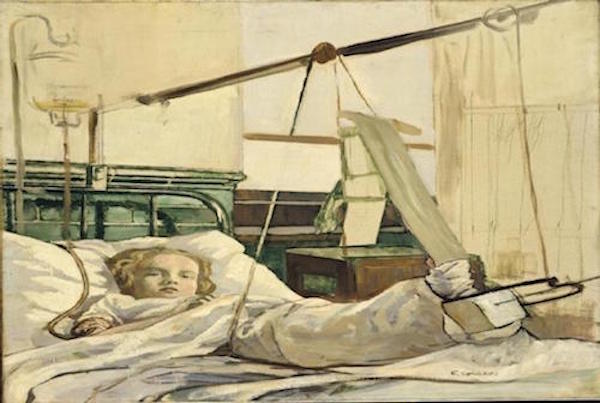Use of Penicillin in 1945, Miguel Torga
Coimbra, 1 February 1945
Penicillin. I too want to try out the last panacea invented by science. On a young boy burning up with fever, pus running out of his ears and terrible pain. In the old days, the tympanic membrane would be doused with milk from a wet nurse which cured it radically. Now it’s penicillin.
When I went to look for it in the house of a patient who had some left over, the father didn’t want to let go of his treasure. He was in possession of a talisman of health, and he didn’t want to sell it or to give it to anyone at all. He was drunk: perhaps that was why he believed with a supernatural force in the magic of this drug. His wife, who was steadier, intervened and they finally gave me the holy viaticum.
At my other patients’ house they were waiting for the miracle treatment in their prayers. And I gave the injection, both in humility and in humiliation. On one hand I knew that the yeast in question would have become ridiculous fifty years hence; on the other I knew that it represented the highest point so far reached by the ingenuity and hope of man.
What would you say about that, you Greek philosophers, who didn’t believe in achievements! You who restricted yourselves to speculation, comprehension, beauty and natural health!
Extract from Miguel Torga’s diary – pages 18-22 of the pdf, translated from Portuguese by Iain Bamforth
Commentary
During the time of Torga’s diary entry, it may not have been uncommon for Penicillin to be seen as he described, “the highest point so far reached by the ingenuity and hope of man”. As a serendipitous discovery in 1928 by Sir Alexander Fleming, Penicillin was seen as a ‘wonder drug’ for a variety of conditions from children’s ear infections to soldiers’ wound infections in World War 2.
In the current century, the growing impact of antibiotic resistance can be felt globally by governing bodies, doctors and most importantly, patients. Torga’s writing style – personal and descriptive, compels us to share his excitement of using Penicillin. However, it may also make us wonder of the possibility of an antibiotic to be described (in the future), synonymously to the words from the extract – “the treasure”, “the holy viaticum” and “the talisman of health”.
Miguel Torga (pseudonym of Adolfo Correia da Rocha) was a Portuguese physician and writer. As a distinguished writer of the 20th century, he wrote short stories, poems, theatre and a 16 volume diary, mostly set in Portugal. Bringing in an element of depth and wisdom unique to his life experiences, his rural upbringing only added more flavour to his writings.
More evident in some of his other diary entries, Torga was protective of his patients, not just in terms of keeping them alive and well but, of their dignity as a human being. Despite the low-resource setting, he strived to provide the best form of care possible for them. “Medicine is a duty, Literature a discipline”, Torga had said. His written work does indeed reflect both, his duty and discipline.
Further info
- Miguel Torga – A brief biography
- Medicine in Torga’s literary work – Abstract on PubMed highlighting some medical elements in Torga’s work
- History of Penicillin – A timeline of events leading to the discovery
- Penicillin in the World War 2 – Some history on Penicillin’s crucial role during the war
- Imperial War Museum (IWM) – Main website with the museums’ addresses, a list of their events and exhibitions. They have several works of art depicting medical services during war.
- Featured image: A child receiving penicillin treatment (IWM, London)
- Sir Alexander Fleming : A portrait of the Scottish scientist behind the discovery of Penicillin
- Antimicrobial resistance (AMR) – WHO website for more up-to-date information and learning
Contributed by
Lekaashree Rambabu
Rate this post

